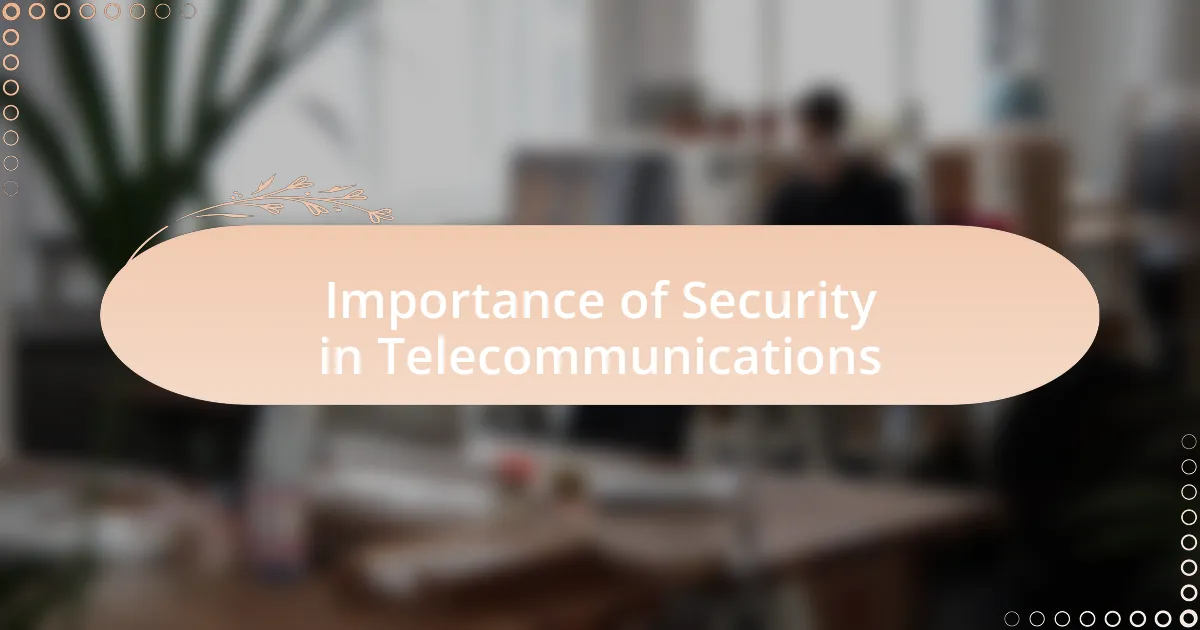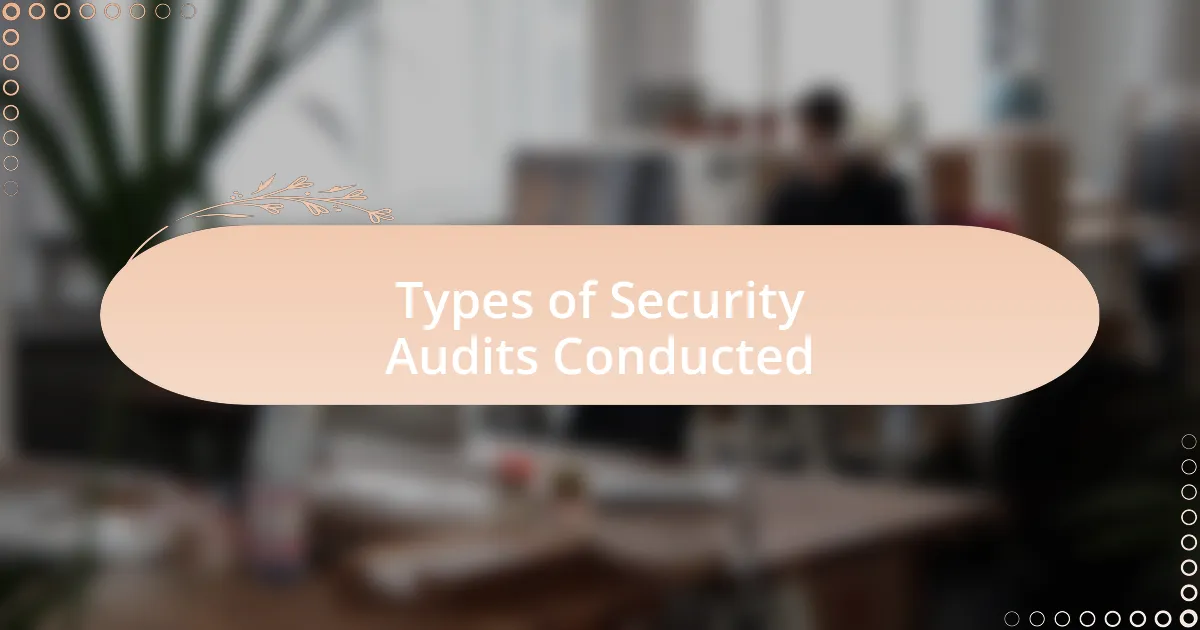Key takeaways:
- Security is vital in telecommunications to protect vast amounts of personal data and maintain consumer trust against cyber threats.
- Different types of security audits, such as compliance audits, vulnerability assessments, and penetration testing, are crucial for identifying and mitigating risks.
- Documentation, team collaboration, and continuous improvement are essential lessons learned during security audits, highlighting the need for thorough processes and effective communication.
- Preparing for audits requires maintaining a detailed asset inventory, fostering clear communication among team members, and utilizing automation tools for efficiency and accuracy.

Importance of Security in Telecommunications
Security is the backbone of telecommunications, fundamentally protecting the vast data that flows across networks every second. I vividly recall a time when a minor breach at a service provider disrupted services for thousands of users. It made me realize just how delicate our communications can be; a small hole in security can lead to widespread consequences.
Consider how much of your personal life is shared via mobile devices and the internet. Have you ever thought about what happens to your information if the underlying security isn’t strong? I’ve experienced anxiety when dealing with operating systems that lacked robust defenses. It’s a daunting feeling, knowing that my personal data could potentially fall into the wrong hands.
In my experience, the trust we place in telecom companies is significant, and any security lapse could destroy that trust entirely. I often wonder, what would happen if a major player faced a crippling cyberattack? This is particularly alarming given the rise in sophisticated cyber threats today. Investing in security measures isn’t just a precaution; it’s essential for maintaining consumer confidence and protecting the integrity of the entire telecommunications infrastructure.

Types of Security Audits Conducted
When it comes to security audits, there are several types that organizations typically conduct to safeguard their systems. One that stands out to me is the compliance audit, which ensures that a company adheres to regulations like GDPR or HIPAA. I remember discussing this aspect with a colleague who worked for a healthcare provider; they emphasized how crucial these audits are not just for legal reasons but also for building patient trust.
Another prevalent type is the vulnerability assessment. This is where teams actively look for weaknesses in a network or system. I recall a project where we identified a simple misconfiguration that could have allowed unauthorized access, reminding me that sometimes even minor oversights can lead to major vulnerabilities. It’s a fascinating process that can unveil hidden risks lurking beneath the surface.
Lastly, I can’t overlook penetration testing, often referred to as “ethical hacking.” Here, skilled professionals simulate cyberattacks to discover potential weaknesses. I once participated in a penetration test simulation, and the adrenaline rush as we uncovered a critical flaw was unforgettable. It made me appreciate the proactive measures that organizations need to take in an ever-evolving threat landscape.

Lessons Learned from the Process
During the security audit process, I discovered the importance of documentation. I remember pouring over audit trails and logs, realizing they’re not just paper trails but valuable sources of truth. How often do we overlook these details? A meticulous approach helps uncover anomalies that could otherwise go unnoticed.
Another lesson emerged around team collaboration. During one audit, our team was diverse, bringing together different perspectives and expertise. I felt the synergy boost our effectiveness, as seen when we resolved a complex issue stemming from a lack of communication. Why is it that some organizations still work in silos? Sharing insights can illuminate paths to solutions that might seem obscured from a single viewpoint.
Lastly, the need for continuous improvement became quite clear to me. After completing one particular audit, I initiated a post-audit review, asking the team for feedback on what worked and what didn’t. This reflective practice sparked a conversation about evolving our strategies in light of new vulnerabilities. It made me wonder—how can we ever feel secure if we don’t revisit our processes? Embracing a growth mindset is essential in cybersecurity.

Tips for Future Security Audits
When preparing for future security audits, one of the most crucial tips is to maintain a comprehensive inventory of assets. In my experience, knowing exactly what needs to be protected is half the battle won. I vividly recall a situation where we missed auditing a critical application simply because we had an incomplete asset list. Had we double-checked that inventory, we might have identified vulnerabilities that could have led to significant risks.
Communication is another essential aspect. I’ve often found that setting clear expectations with all team members beforehand greatly enhances the audit process. During one particularly intense audit, we held a pre-meeting where everyone voiced their concerns and expectations. This not only brought us all onto the same page but also reduced anxiety. So, how can you ensure everyone feels heard and engaged before diving into an audit? Just asking for feedback can work wonders.
Lastly, leverage automation tools whenever possible. Integrating software to scan for vulnerabilities can save you hours of manual work and leads to more accurate results. I remember introducing a vulnerability scanner that provided us with a wealth of information in minutes, allowing my team to focus on critical analysis instead. Are you still relying on manual methods? If so, consider the efficiency that automation can bring to your next audit, freeing you up for deeper, more thoughtful analysis.